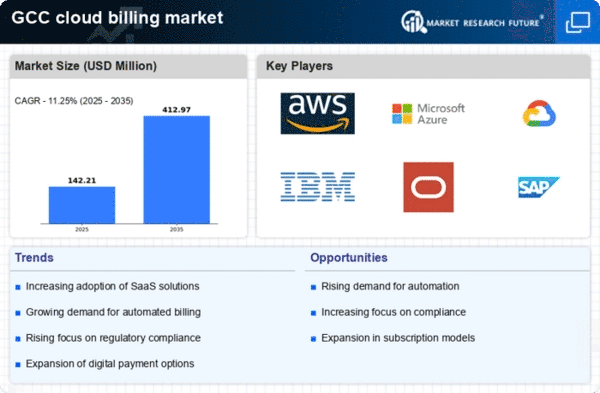Emergence of Innovative Payment Solutions
The cloud billing market is witnessing the emergence of innovative payment solutions that cater to the evolving needs of consumers in the GCC. As digital wallets and contactless payment methods gain traction, businesses are compelled to adopt billing systems that support these technologies. This shift is indicative of a broader trend towards cashless transactions, which is expected to grow by 20% annually in the region. Consequently, the cloud billing market is adapting to incorporate these new payment methods, ensuring that businesses can offer a variety of options to their customers, thereby enhancing convenience and satisfaction.
Growth of E-commerce and Digital Services
The expansion of e-commerce and digital services in the GCC is significantly influencing the cloud billing market. As more businesses transition to online platforms, the need for efficient billing systems that can handle high transaction volumes is becoming increasingly apparent. Recent statistics indicate that e-commerce sales in the GCC are projected to reach $28 billion by 2026, which underscores the potential for growth in the cloud billing market. This trend is prompting companies to adopt cloud-based billing solutions that can seamlessly integrate with their e-commerce platforms, thereby enhancing operational efficiency and customer experience.
Rising Demand for Flexible Billing Solutions
The cloud billing market is experiencing a notable surge in demand for flexible billing solutions across various sectors in the GCC. Businesses are increasingly seeking systems that can accommodate diverse pricing models, such as pay-as-you-go and tiered pricing. This shift is driven by the need for cost efficiency and the desire to enhance customer satisfaction. According to recent data, the GCC region has seen a growth rate of approximately 15% in the adoption of flexible billing solutions. As organizations strive to optimize their financial operations, the cloud billing market is positioned to benefit significantly from this trend, as it allows for greater adaptability in billing practices.
Increased Focus on Data Security and Compliance
In the cloud billing market, the emphasis on data security and compliance is intensifying, particularly in the GCC region. With the rise of digital transactions, businesses are prioritizing secure billing systems that protect sensitive customer information. Regulatory frameworks in the GCC are evolving to address these concerns, leading to a heightened demand for compliant cloud billing solutions. It is estimated that around 70% of organizations in the region are now investing in advanced security measures to safeguard their billing processes. This focus on security not only enhances customer trust but also positions the cloud billing market as a critical component in the broader digital transformation landscape.
Investment in Cloud Infrastructure and Technology
Investment in cloud infrastructure and technology is a driving force behind the growth of the cloud billing market in the GCC. As organizations increasingly recognize the benefits of cloud computing, there is a corresponding rise in the deployment of cloud-based billing solutions. Recent reports suggest that spending on cloud services in the GCC is anticipated to exceed $10 billion by 2025. This influx of investment is likely to enhance the capabilities of cloud billing systems, enabling businesses to leverage advanced analytics and automation. As a result, the cloud billing market is poised for substantial growth, driven by technological advancements and increased adoption of cloud services.
















